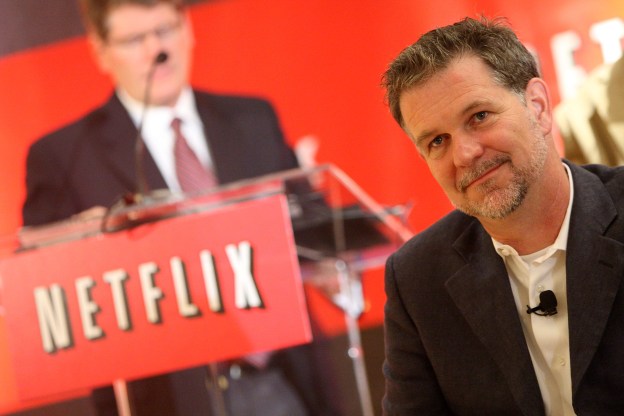
In its earnings call with investors today, Netflix announced that it lost about 800,000 subscribers during the third fiscal quarter of this year. Over the same period, the company also managed to bring in record revenue, exceeding the expectations of Wall Street analysts.
Last month, Netflix announced that it expected to have a total subscriber base of 24 million at the end of this quarter. The actual number is 23.8 million (21.5 million streaming, 13.4 million DVD rental) subscribers. While this is only slightly lower than anticipated (if you can call 200,000 of anything ‘slight’), investors are not taking the news well. Netflix’s stock has tumbled more than 20 percent in after-hours trading to around $92 (at the time of this writing). That’s down from a high earlier this year of about $300.
Netflix posted profits of $62 million, a 63 percent jump from last year, on $822 million in revenue (at 49 percent leap). Wall Street analysts had expected revenue of about $811 million in the third quarter.
The drop in subscribers follows a tumultuous three months for Netflix and its CEO, Reed Hastings. In July, the company announced that it would boost the price of receiving both streaming services and DVD rentals by a minimum of 60 percent a month (from one $9.99 plan to two separate $7.99 plans), sparking user outcry that continues to reverberate throughout Netflix headquarters, for sure.
Then Hastings announced that Netflix was going to split in two, and create two separate businesses: Netflix would be streaming-only; and a new company, foolishly named Qwikster, would handle the mail-order DVD rental business. Hastings justified the move, saying that the two sides to the business already operated independently inside the company, it made good sense for them to split into separate entities in public as well.
Once again, customers became enraged and, less than a month later, Hastings reversed the Qwikster decision, saying that Netflix would remain one company.
In a letter to investors released today (pdf), Netflix had this to say about its back-to-back debacles:
…We think that $7.99 for unlimited streaming and $7.99 for unlimited DVD are both very aggressive low prices, relative to competition and to the value of the services, and they are the right place for Netflix to be in the long term. What we misjudged was how quickly to move there. We compounded the problem with our lack of explanation about the rising cost of the expansion of streaming content, and steady DVD costs, so that absent that explanation, many perceived us as greedy. Finally, we announced and then retracted a separate brand for DVD. While this branding incident further dented our reputation, and caused a temporary cancellation surge, compared to our price change, its impact was relatively minor. Our primary issue is many of our long‐term members felt shocked by the pricing changes, and more of them have expressed that by canceling Netflix than we expected.
The company expects its US subscribers to grow slightly during the fourth quarter, from 20 million streaming customers to 21.5 million; and from 10.3 million DVD customers to 11.3 million. Despite the growth, and expansion in the UK and Ireland early next year, Netflix says it expects to fall into the red during the fourth quarter.


